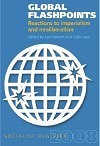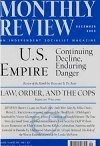Imperialism
An indication of just how bad things have become for the U.S. invaders and occupiers of Iraq is that comparisons with the Vietnam War are now commonplace in the U.S. media. In a desperate attempt to put a stop to this, President Bush intimated on April 13, in one of his rare press conferences, that the mere mention of the Vietnam analogy in relation to the present war was unpatriotic and constituted a betrayal of the troops. Yet the question remains and seems to haunt the U.S. occupation of Iraq: To what extent has Iraq become another “Vietnam” for American imperialism? | more…
The situation in Iraq is going badly for the occupying U.S. forces. Despite a staged-for-television proclamation of victory aboard an aircraft carrier in the Pacific Ocean last year, President Bush has recently found his policies, from spurious reasons for waging war against Iraq, to the badly bungled early occupation, to politically-inspired deadlines for handing over “authority” to an as yet nonexistent Iraqi government, criticized more and more frequently | more…
Michael Hardt and Antonio Negri’s Empire, published by Harvard University Press in 2000, took the intellectual world by storm. After the declared demise of “grand narratives” and projects of human emancipation, here came a book that told the grandest of all stories, the totalization of capital, and anticipated the most magnificent of all revolutionary outcomes, communism. Postmodern taboos were shattered, or so it seemed. The prophets of the multitude, Hardt and Negri, were duly acknowledged and celebrated in the liberal press. In the United Kingdom, the New Statesman ran an interview with Negri entitled “The left should love globalization.” Globalization, Negri stated, leads to real democratic “global citizenship.” In the United States, New York Times reviewer Emily Eakin hailed Empire as the “next big idea,” announcing the arrival of a badly-needed “master theory” to overcome the “deep pessimism,” “banality” (Stanley Aronowitz’s term), “crisis,” and “void” that have characterized the humanities in the last decade. Empire (both book and concept) was good news for everyone, ushering in a period that, while difficult to define, is, in Hardt’s words, “actually an enormous historical improvement over the international system and imperialism.” | more…
Although private corporations under capitalism have always been heavily involved in promoting war, the direct role played by the private sector in the prosecution of war has traditionally been quite limited, falling well short of the supply of combat troops. There are signs that this may now be changing. The decade and a half since the end of the Cold War has seen the rapid proliferation of private military firms, hundreds of which are now engaged in combat and combat-support operations in Iraq and throughout the globe. Some of these firms are subsidiaries of much larger multinational corporations. The private soldiers employed in this industry are mercenaries, but not of the traditional kind. They are employees of corporations that have boards of directors, are publicly traded, participate in the open market, carry out mergers, hire and fire in accordance with market criteria—and above all are not directly responsible to any public authority. In other words, these corporations and their employees are fully integrated with capitalist enterprise as a whole. This phenomenon has recently been dubbed “the corporatization of the military” by Peter Singer, a Brookings Institution analyst and author of Corporate Warriors (2003) | more…

Since 1964, the Socialist Register has brought together leading writers on the left to investigate aspects of a common theme. Global Flashpoints: Reactions to Imperialism and Neoliberalism examines the distinguishing features of neoliberalism today as well as the prospects for the left in the Islamic world, in Latin America, and in the capitalist North. | more…
Food is an essential human need. All cultures involved in settled agriculture have produced food and food production is basic to all culture. The seed used in agricultural cultivation is the product of thousands of years of cultural development. Most of this development of food crops over the millennia has occurred in regions that are now in the periphery of the capitalist world economy. In recent years, however, agribusiness corporations located in the rich nations of the core have attempted to patent various forms of food crops, such as basic grains, and then to monopolize these patented grain varieties, creating dependence on seeds of the agribusiness corporations. When such practices involve, as in recent years, a crop such as rice on which much of the world’s population depends for subsistence, the implications are enormous and potentially disastrous for the world’s poor | more…
U.S. Middle Eastern strategy for the decade 1991–2000 had run up against its limits on both of its main fronts: the Israeli-Palestinian front, and the Arab-Persian Gulf | more…
Historical materialists are not prophets; they do not predict the future course of history. They are concerned rather with the present as history. This fundamental principle of Marxist thought is called to mind by our reencounter recently with a common misinterpretation of Lenin’s Imperialism. In his new book, The New Imperialism, David Harvey writes (p. 127): “I therefore think Arendt is…correct to interpret the imperialism that emerged at the end of the nineteenth century as the ‘first stage in political rule of the bourgeoisie rather than the last stage of capitalism’ as Lenin depicted it.” (See also Harvey’s piece “The ‘New’ Imperialism” in the Socialist Register, 2004, p. 69.) | more…

On October 27, 2003, the New York Times ran a guest column on its Op-Ed page by David L. Kirp entitled “How Much for That Professor?” The piece, which was about universities spending big bucks to get professors with star power, focused in its opening and closing paragraphs on the case of Niall Ferguson, described as “the most widely discussed and controversial British historian of his generation.” Last winter, New York University successfully recruited Ferguson away from Oxford University with promises of big money and reduced teaching responsibilities. Barely six months later Harvard lured Ferguson away from New York University with an offer of even bigger rewards | more…
“Global hegemony” might be defined as a situation in which one nation-state plays a predominant role in organizing, regulating, and stabilizing the world political economy. The use of armed force has always been an inseparable part of hegemony, but military power depends upon the economic resources at the disposal of the state. It cannot be deployed to answer every threat to geopolitical and economic interests, and it raises the danger of imperial overreach, as was the case for Britain in South Africa (1899–1902) and the United States in Vietnam (1962–1975) | more…
We are living in a period in which the rhetoric of empire knows few bounds. In a special report on “America and Empire” in August, the London-based Economist magazine asked whether the United States would, in the event of “regime changes … effected peacefully” in Iran and Syria, “really be prepared to shoulder the white man’s burden across the Middle East?” The answer it gave was that this was “unlikely”—the U.S. commitment to empire did not go so far. What is significant, however, is that the question was asked at all. | more…
The profound hypocrisy and inherent barbarism of bourgeois civilization lies unveiled before our eyes, moving from its home, where it assumes respectable form, to the colonies, where it goes naked (Karl Marx, “The Future Results of British Rule in India,” New York Daily Tribune, January 22, 1853).
Marx’s statement is telling and relevant. Capitalism has always acted as a global system, working across or between nation states. The ever-present imperative to produce profit has pushed capital from its historic heartlands in northern Europe to all societies. But as Marx implies, the process of expansion has not been a homogenizing one: the bourgeoisie has double standards, or perhaps multiple standards, as it negotiates its presence in a wide variety of locations. The standards that most would define as minimally acceptable (social democracy) have been a product of specific historical and material conditions: a result of the emergence of institutionally robust and interventionist states and the political demands of working classes. But, these historical conditions are part of the same conditions that produced very different states and economies in sub-Saharan Africa: the colonial states arising from the scramble for colonies of the late 1880s are themselves part of the same capitalism which produced the bourgeois civilization that Marx ironically attributes to late Victorian England. The hypocrisy is that civilization in Europe, plus plunder, primitive accumulation, and famine in the colonial world were part of the same overarching liberal ideals | more…

